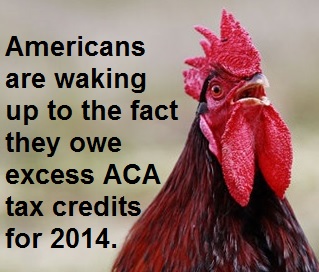
Can excess ACA tax credits be considered a short term loan?
One of the common complaints during tax season for individuals and families who are set to receive a federal refund is that the government got to use their money for a year before refunding it to them. Now, households who have to repay excess ACA tax credits find themselves in the situation where they got to use a federal subsidy before they have to refund the money back to the federal government. In a sense, the excess tax credit received during the year, by virtue of a household under estimating their Modified Adjusted Gross Income, were short term loans that now have to be repaid without interest or penalties.
Excess ACA tax credits as short term loans
I know it may sound like an odd concept to say that having to repay excess ACA health insurance premium tax credits has an upside, but interest free loans aren’t bad. There will be many individuals and families who under estimated their Modified Adjusted Gross Income (MAGI). The net result is that their health insurance premium was lower than it should have been because of the increased tax credit. The difference between the tax credit that was advanced to the health plan and the smaller credit that should have been advanced if the MAGI would have been properly calculated is essentially a short term loan. Had the MAGI been properly calculated, the health insurance premium would have been higher.
Underestimate MAGI
Stephen and Mathew, not their real names, under estimated their MAGI because they were erroneously told not to include Mathew’s Social Security Disability Insurance (SSDI) payments as income. When they realized they should report that income, they made a change to their MAGI in their Covered California account increasing their estimated annual income. When they received their 1095-A and started filling out the IRS Form 8962 to reconcile their premium tax credits they were shocked to learn they would OWE $1,800 in excess tax credits.
Disputing 1095-A amounts
Concerned they had to repay so much money to the IRS, wiping out any federal refund they may have received otherwise, they requested a corrected 1095-A from Covered California. However, the information on the 1095-A they received in Column C about how much tax credit they received was correct. It’s just that the tax credit advanced was based on an under estimated MAGI. Is there any help for Stephen and Mathew’s situation?
Repaying back health insurance premiums
While it’s possible, but highly unlikely, Covered California could adjust Stephen and Mathew’s MAGI for 2014 to reflect a lower tax credit. But this would mean that Covered California would have to debit the account of the health insurance carrier to whom they made the advance tax credits. Since the health insurance carrier is not going to absorb the loss of premiums, they would have to send Stephen and Mathew an invoice for unpaid premium amounts for the year. Now, instead of owing the IRS, Stephen and Mathew would have to immediately pay the back premiums to the health insurance carrier or risk losing their health insurance coverage over a past due account.
You will get a bill from some one
While the above scenario of the health insurance company invoicing for past due premiums may also sound crazy, it has happened. I had a client who moved from one region of California to another rating region. The new region had higher health insurance premiums for the exact same plan. The insurance company, on erroneous information form Covered California, made the new plan with the higher rate effective retroactively to when my client initially enrolled. She subsequently received an invoice for unpaid premium balances equivalent to the difference between the lower rate and higher rate, even though she had lived in the lower premium rate region for months before moving to the new region. This was a total billing nightmare that took months to sort out.
Over subsidized
The reality of the situation is that those advance premium tax credits are already out of the barn and the door has closed. The rooster is crowing and folks are waking up to the reality that they were over subsidized during the year. Like Stephen and Mathew told me, they didn’t want a short term interest and penalty free loan to lower their health insurance premiums. But they got one courtesy of the Marketplace exchange and the IRS.
Consumers need more help with MAGI
What this illustrates is the failure of the Marketplace exchanges like Covered California, Certified Insurance Agents, and Certified Enrollment Counselors to properly help people estimate their MAGI. There isn’t much of a silver lining to the situation of a family having to repay the excess tax credits unless you change the perspective and say, “I got to use the government’s money for a while”. That’s actually little consolation, but all some folks will have as they write a check to the IRS to repay the excess tax credits.